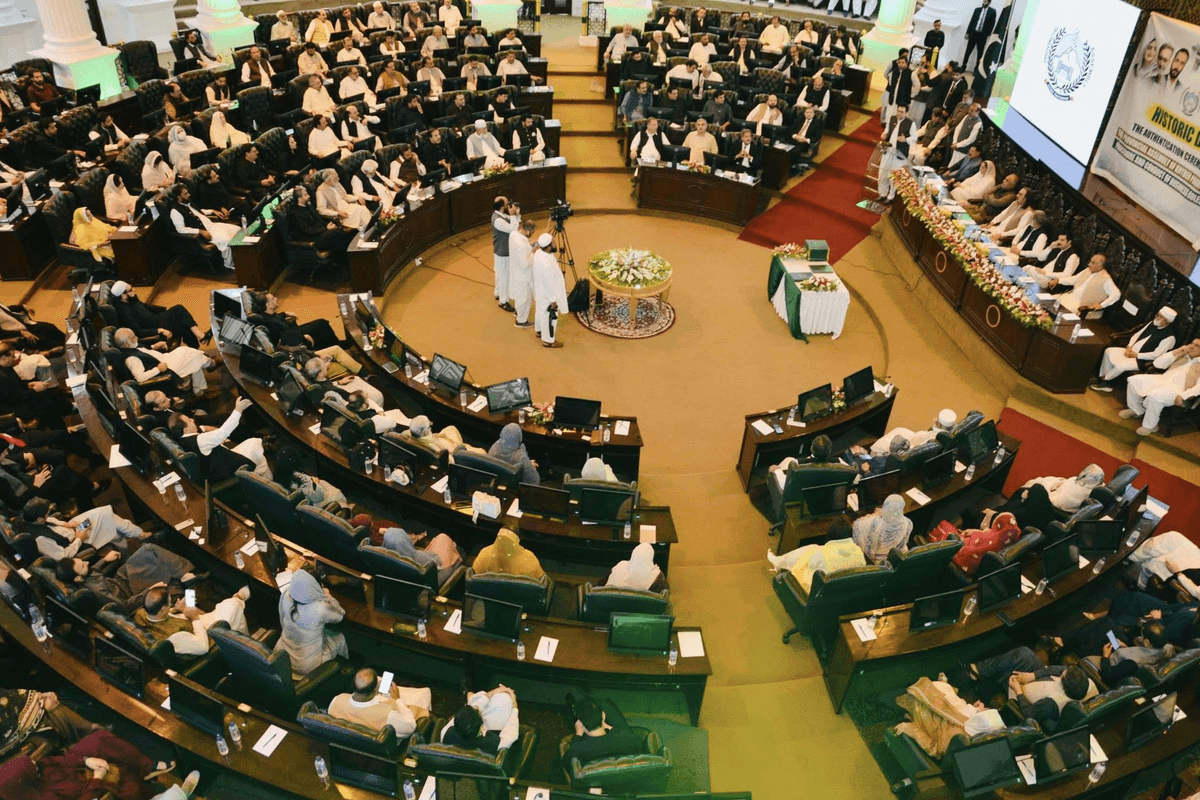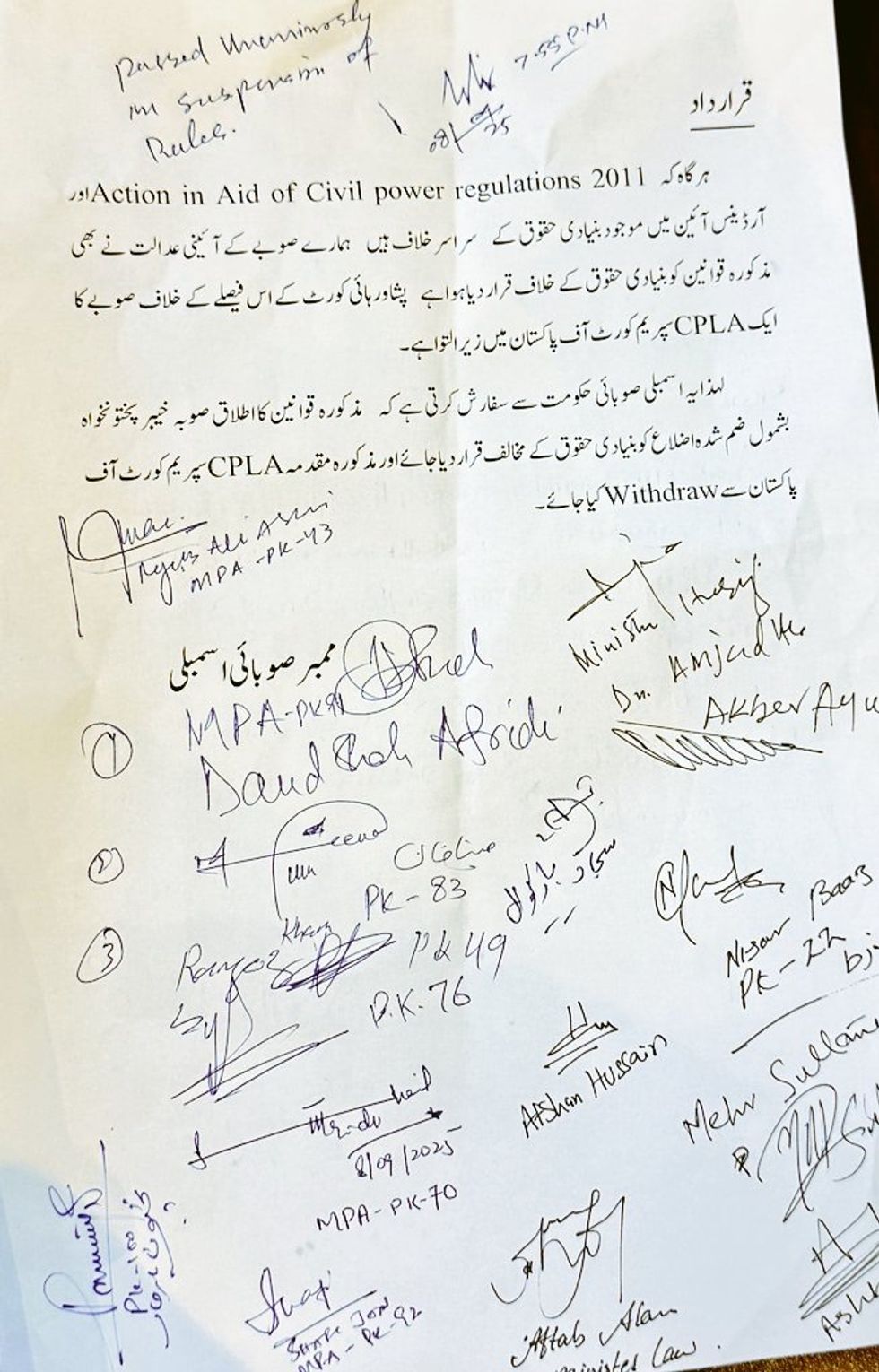Pakistan’s Khyber Pakhtunkhwa rolls back law allowing detention without trial
Provincial govt withdraws petition in Supreme Court, moving to scrap law critics say allowed indefinite detention

Kamran Ali
Correspondent Nukta
Kamran Ali, a seasoned journalist from Khyber Pakhtunkhwa, Pakistan, has a decade of experience covering terrorism, human rights, politics, economy, climate change, culture, and sports. With an MS in Media Studies, he has worked across print, radio, TV, and digital media, producing investigative reports and co-hosting shows that highlight critical issues.

A general view of Khyber Pakhtunkhwa assembly.
Courtesy: KP Assembly website
Pakistan’s Khyber Pakhtunkhwa (KP) government has decided to roll back Actions (in Aid of Civil Power) Regulations, 2011, calling the controversial security law unconstitutional and a violation of fundamental human rights.
The provincial cabinet has approved withdrawing the KP government’s petition from Pakistan’s Supreme Court. Chief Minister Sohail Afridi confirmed the move, saying he had pledged to roll back the regulations because they violated human rights. “We approved the withdrawal in line with that commitment,” he said.
On September 8, the KP Assembly had passed a resolution urging the provincial government to withdraw its appeal.
What is in the regulations?
Shabbir Hussain Gigyani, a Supreme Court advocate and petitioner in the case, says both federal and provincial authorities relied on the Actions (in Aid of Civil Power) Regulation — enacted in 2011 but applied retrospectively from 2008 — to give legal cover to the detention of civilians by security forces in the former Federally Administered Tribal Areas (FATA) and Provincially Administered Tribal Areas (PATA). The law, he argues, effectively legitimized internment centers and prolonged detention without trial.
After the FATA merger, Gigyani noted, the KP government reinforced the framework through the Continuation of Laws Act, 2019, extending even wider protections to security agencies. Quoting the law, he said: “Any action taken by law enforcement agencies in the discharge of their official duties shall be deemed valid and shall not be called into question in any court of law.”

According to Gigyani, 26 internment centers holding more than 8,000 detainees have been officially notified under the regulation, with conditions he describes as alarming. “In many cases, the treatment of detainees is worse than what has been reported from Guantanamo Bay,” he said, adding that the absence of due process and prolonged incommunicado detention amounted to serious violations of fundamental rights.
Pending before SC since 2019
The Peshawar High Court (PHC) had struck down the regulation as unconstitutional, ruling in favor of a petition filed by Gigyani and directing that all internment centers be placed under the prisons department as sub-jails. But the then PTI-led government appealed the decision in the Supreme Court, which subsequently suspended the PHC ruling.
Gigyani told Nukta that despite repeatedly submitting applications, the Supreme Court has yet to schedule a hearing — more than five years after issuing the stay in 2019.
Impact of withdrawal
Shumail Butt, former Advocate General, says a separate petition is needed to have the stay order vacated, noting that the issue falls squarely under the jurisdiction of the Federal Constitutional Court. “It will be up to the Constitutional Court to decide the legal basis for striking down the regulation and to determine the fate of the provincial government’s petition,” he added.
Gigyani said that withdrawing the petition from the Supreme Court would not be enough to end the case, as the federal government and Ministry of Interior are also involved. The court could remove the provincial government as a party, but the law would remain in force. “If the provincial government is serious, it can abolish the law permanently in a single step through a repeal act, given PTI’s clear majority in the assembly,” he added.
Ali Gohar Durrani, a senior lawyer, says scrapping the regulations will not impact security operations in the province, as such actions fall squarely under federal authority. He notes, however, that the move will roll back a range of special powers — including the operation of detention centers, arrest provisions and other extraordinary measures — that have been available under the regulation.
Irfan Saleem, Provincial Additional General Secretary of PTI, said the government is serious about the move and will consider abolishing the law through a repeal act in the provincial assembly after withdrawal from SC.







Comments
See what people are discussing